2015英语二轮复习专题7:情态动词
【英语】高考英语二轮复习 专项训练 情态动词含解析
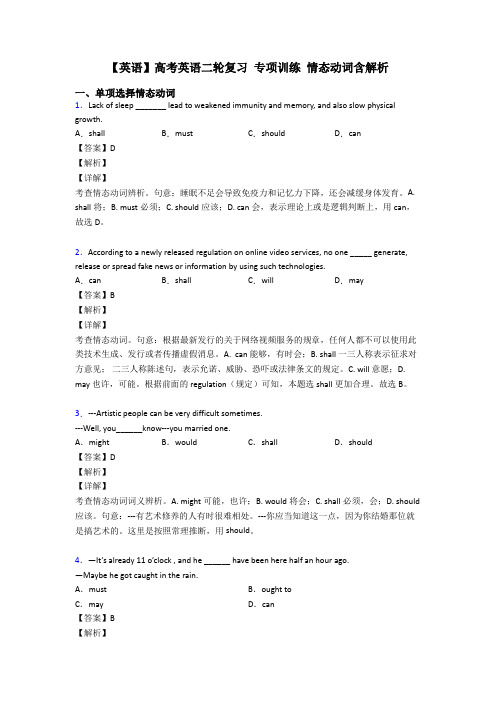
【英语】高考英语二轮复习专项训练情态动词含解析一、单项选择情态动词1.Lack of sleep _______ lead to weakened immunity and memory, and also slow physical growth.A.shall B.must C.should D.can【答案】D【解析】【详解】考查情态动词辨析。
句意:睡眠不足会导致免疫力和记忆力下降,还会减缓身体发育。
A. shall将;B. must必须;C. should应该;D. can会,表示理论上或是逻辑判断上,用can,故选D。
2.According to a newly released regulation on online video services, no one _____ generate, release or spread fake news or information by using such technologies.A.can B.shall C.will D.may【答案】B【解析】【详解】考查情态动词。
句意:根据最新发行的关于网络视频服务的规章,任何人都不可以使用此类技术生成、发行或者传播虚假消息。
A. can 能够,有时会;B. shall 一三人称表示征求对方意见;二三人称陈述句,表示允诺、威胁、恐吓或法律条文的规定。
C. will 意愿;D. may 也许,可能。
根据前面的regulation(规定)可知,本题选shall更加合理。
故选B。
3.---Artistic people can be very difficult sometimes.---Well, you______know---you married one.A.might B.would C.shall D.should【答案】D【解析】【详解】考查情态动词词义辨析。
A. might可能,也许;B. would将会;C. shall必须,会;D. should 应该。
情态动词用法总结

情态动词用法总结情态动词,又称情态助动词,是英语中一类特殊的助动词,包括can、could、may、might、must、shall、should、will、would等。
它们通常与动词原形搭配使用,用来表示说话人对动作或状态的态度、推测、许可、义务、建议等。
下面将分别从这几个方面进行总结情态动词的用法。
1. 表示能力和才能:can、could和able to都可以表示能力和才能,但用法稍有不同。
can和able to可以用来表示现在或将来的能力,而could则表示过去的能力或偶然的能力。
例如:- I can swim.(我会游泳)- She could speak three languages when she was 15.(她15岁时会说三种语言)- He was able to finish the task on time.(他能够按时完成任务)2. 表示推测和可能性:may、might和could可用来表示推测和可能性,其中may比might更常用,could表示可能性最低。
例如:- He may be at home.(他可能在家)- It might rain this afternoon.(今天下午可能会下雨)- She could be in the library.(她有可能在图书馆)3. 表示许可和禁止:can、could和may可用来表示许可,could表示客气一些。
而mustn't则表示禁止。
例如:- You can go now.(你可以走了)- Could I use your computer?(我能用一下你的电脑吗?)- You mustn't smoke here.(你不能在这里抽烟)4. 表示义务和必要性:must表示主观上的义务和必要性,常用来表示说话人的主观判断。
have to则表示客观上的必要性和强制性。
例如:- I must finish my homework tonight.(我必须今晚完成作业)- I have to get up early tomorrow.(我明天必须早起)5. 表示建议和推荐:should和ought to都表示建议或推荐,should更常用一些,ought to用得相对较少。
高考英语第二轮复习情态动词_教学资料

看高考试题,学情态动词情态动词主要用来表示说话人的情感、态度等,是中学英语语法的重点,也是高考的热点,是单项填空必考的一个知识点。
情态动词在近五年高考中主要考查四点:情态动词表示推测和可能性的用法;情态动词与虚拟语气;情态动词的表达“情感、态度、语气等”,情态动词表示“必要性”等方面的用法。
请看近五年有关情态动词与虚拟语气考点分布表:二、情态动词试题的突破方法:(1) 学生首先从整体上把握情态动词的语法和语义特征。
(2) 逐个学习,了解每个情态动词的用法特征,尤其要熟练掌握一些常用或常考情态动词的基本用法并认真区别具有相同功能的、意思相近的情态动词的用法。
(3) 收集并熟练掌握真实的口语材料和近几年高考有关情态动词的试题,在真实的语境中去体会、领悟、印证、掌握情态动词的用法特征和常见考点。
三、情态动词的解题技巧:(2) 认真思考所给选项中情态动词的基本特征和用法,并结合语境推敲答案。
(3) 要注意把握时间概念。
情态动词无论是表达“推测和可能性”,还是表达“虚拟”这一概念,只要是对过去已经发生的事情进行描述,一律用“情态动词+have done”这一结构;对现在或将来的事情进行描述,用“情态动词+动词或系动词原形”。
例如:(NMET山东,24)Thank you for all your hard work last week. I don’t think we ______ it without you.A. can manageB. could have managedC. could manageD. can have managed根据题干中所给出的时间last week可知我们已经做完了工作,已经完成,故排除A、C 两项,再结合could have done表示虚拟语气以及与前面的I don’t think…,故说话者想表达的意思是:离开了你,我们本不可能完成这项工作。
故答案为B项。
四、情态动词用法归类与高考试题分析:(一)表示推测的情态动词对现在或将来情况推测,用情态动词+do / be / be doing…;对过去的推测,用情态动词+have done / been…;表示肯定推测的情态动词按可能性大小依次为must, should / ought to, may, might, could;否定推测,常用can’t / couldn’t,译为“根本不可能”、“想必不会”,表示推测的语气非常肯定,may not, might not或could not译为“可能不”、“也许不”,表示推测的语气不很肯定。
情态动词详解
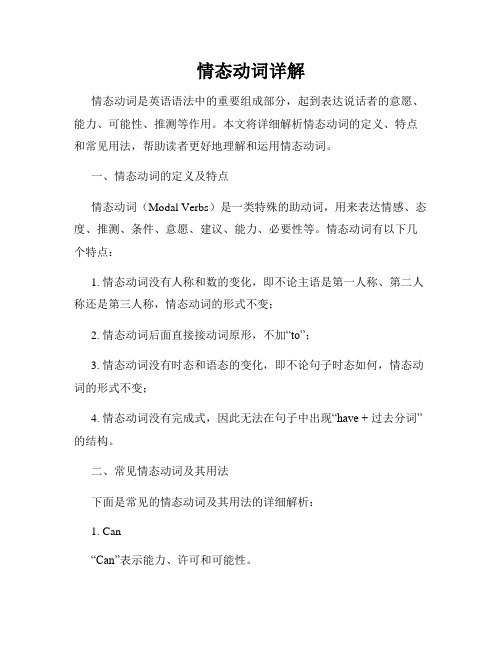
情态动词详解情态动词是英语语法中的重要组成部分,起到表达说话者的意愿、能力、可能性、推测等作用。
本文将详细解析情态动词的定义、特点和常见用法,帮助读者更好地理解和运用情态动词。
一、情态动词的定义及特点情态动词(Modal Verbs)是一类特殊的助动词,用来表达情感、态度、推测、条件、意愿、建议、能力、必要性等。
情态动词有以下几个特点:1. 情态动词没有人称和数的变化,即不论主语是第一人称、第二人称还是第三人称,情态动词的形式不变;2. 情态动词后面直接接动词原形,不加“to”;3. 情态动词没有时态和语态的变化,即不论句子时态如何,情态动词的形式不变;4. 情态动词没有完成式,因此无法在句子中出现“have + 过去分词”的结构。
二、常见情态动词及其用法下面是常见的情态动词及其用法的详细解析:1. Can“Can”表示能力、许可和可能性。
能力:用于表达某人在某方面具有的能力或技能。
例句:He can speak three languages.许可:用于征求或给予许可。
例句:Can I borrow your pen, please?可能性:用于表达可能发生的情况。
例句:It can rain tomorrow.2. Could“Could”是Can的过去式,表示过去或虚拟条件下的能力、许可和可能性。
能力(过去):用于表达过去具备的能力或技能。
例句:When I was young, I could run very fast.许可(过去):用于过去征求或给予许可。
例句:Could I use your phone yesterday?可能性(虚拟条件):用于表示虚拟情况下的可能性。
例句:If I had enough money, I could travel around the world.3. May“May”表示允许、可能性、祝愿和推测。
允许:用于征求或给予许可。
例句:May I come in?可能性:用于表达主观推测的可能性。
情态动词和虚拟语气

拟语气的试题偏少,有些省份已将虚拟语气列为不考的项目。
洞察命题动向
感悟真题精髓
把握高考热点
Ⅰ.在下列各句中填入适当的情态动词 1.(2014·北京卷)________ I have a word with you? It won't take long.
2.(2014·大纲卷)Although you ________ find bargains in
they________(come) to our help.
8.(2014·重庆卷)It was John who broke the window.Why
are you talking to me as if I ______ (do) it? 答案 1.would have thrown 6.Had 2.would be 3.Were 4.had
going to rain.
—Well,I don't know.It ________ do. 17 . (2013· 辽 宁 卷 ) Harry is feeling uncomfortable.He ______________ too much at the party last night.
telecommunications,we would have to wait for weeks to
get news from around the world.
洞察命题动向
感悟真题精髓
把握高考热点
4 . (2014· 湖 南 卷 )If Mr.Dewey________(be) present , he
洞察命题动向
感悟真题精髓
把握高考热点
4.need的用法
情态动词的用法
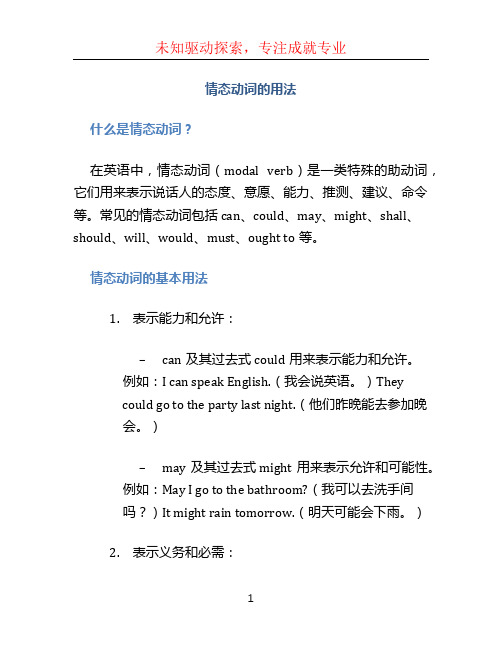
情态动词的用法什么是情态动词?在英语中,情态动词(modal verb)是一类特殊的助动词,它们用来表示说话人的态度、意愿、能力、推测、建议、命令等。
常见的情态动词包括can、could、may、might、shall、should、will、would、must、ought to等。
情态动词的基本用法1.表示能力和允许:–can及其过去式could用来表示能力和允许。
例如:I can speak English.(我会说英语。
)Theycould go to the party last night.(他们昨晚能去参加晚会。
)–may及其过去式might用来表示允许和可能性。
例如:May I go to the bathroom?(我可以去洗手间吗?)It might rain tomorrow.(明天可能会下雨。
)2.表示义务和必需:–must用来表示义务和必需。
例如:You must finish your homework before playing games.(你必须在玩游戏之前完成作业。
)–should用来表示应该和建议。
例如:She should eat more vegetables for her health.(她应该多吃蔬菜保护健康。
)3.表示推测和肯定:–will用来表示未来意愿和不可避免的行为。
例如:I will help you with your presentation.(我会帮你做演讲。
)–would用来表示假设和委婉表达。
例如:If I had more time, I would travel around the world.(如果我有更多时间,我会环游世界。
)情态动词的用法注意事项1.情态动词后接不带to的原形动词,即不加动词的第三人称单数-s形式。
例如:He can swim well.(他游泳游得很好。
)They should study hard.(他们应该努力学习。
情态动词总结知识点
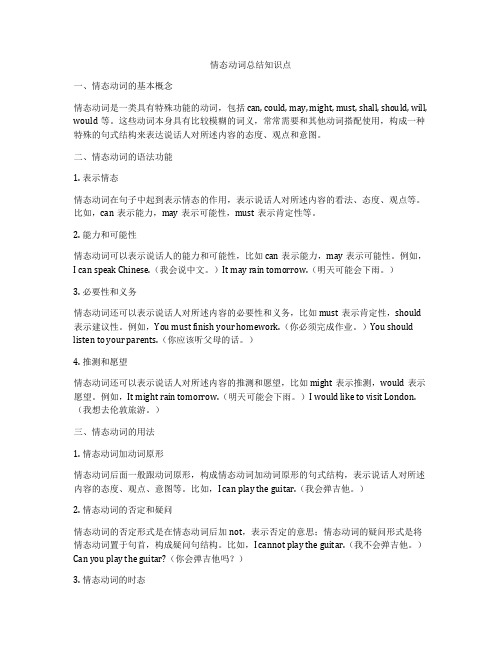
情态动词总结知识点一、情态动词的基本概念情态动词是一类具有特殊功能的动词,包括can, could, may, might, must, shall, should, will, would等。
这些动词本身具有比较模糊的词义,常常需要和其他动词搭配使用,构成一种特殊的句式结构来表达说话人对所述内容的态度、观点和意图。
二、情态动词的语法功能1. 表示情态情态动词在句子中起到表示情态的作用,表示说话人对所述内容的看法、态度、观点等。
比如,can表示能力,may表示可能性,must表示肯定性等。
2. 能力和可能性情态动词可以表示说话人的能力和可能性,比如can表示能力,may表示可能性。
例如,I can speak Chinese.(我会说中文。
)It may rain tomorrow.(明天可能会下雨。
)3. 必要性和义务情态动词还可以表示说话人对所述内容的必要性和义务,比如must表示肯定性,should 表示建议性。
例如,You must finish your homework.(你必须完成作业。
)You should listen to your parents.(你应该听父母的话。
)4. 推测和愿望情态动词还可以表示说话人对所述内容的推测和愿望,比如might表示推测,would表示愿望。
例如,It might rain tomorrow.(明天可能会下雨。
)I would like to visit London.(我想去伦敦旅游。
)三、情态动词的用法1. 情态动词加动词原形情态动词后面一般跟动词原形,构成情态动词加动词原形的句式结构,表示说话人对所述内容的态度、观点、意图等。
比如,I can play the guitar.(我会弹吉他。
)2. 情态动词的否定和疑问情态动词的否定形式是在情态动词后加not,表示否定的意思;情态动词的疑问形式是将情态动词置于句首,构成疑问句结构。
比如,I cannot play the guitar.(我不会弹吉他。
英语二轮复习教学案:专题07情态动词和虚拟语气(解析版)

【2014考纲解读】情态动词的用法复杂多变,在高考试题中占的比重一直比较稳定,每年总有一至两个题,可以单独考查,也可以结合虚拟语气考查.命题者常常利用语境和句子之间意义上的细微差别来考查考生对情态动词的理解和掌握,难度也保持较为稳定的趋势.其考点主要包括:1.考查情态动词的基本用法。
如:can和could的用法及区别;will和would的用法及区别;must的用法;shall用于不同人称时的用法和should的各种用法; need的用法等。
2.考查情态动词的“推测”功能。
如:can,could,may,might,must 皆可表示推测,使用时要注意以下几点:(1)注意语气。
语气较强用must,cannot,couldn’t; 语气较弱用may,might或can,could; (2)注意句式。
在肯定句中,一般用may,might,must;在否定句、疑问句中常用can,could; (3)注意时态。
表示对现在或将来的情况的推测,此时通常用“情态动词+动词原形”结构;表示对现在或将来正在进行的情况进行推测,通常用“情态动词+进行体”结构;表示对过去情况的推测,通常用“情态动词+完成体"结构。
3.考查情态动词的特殊用法。
如:(1)cannot/can’t 与too/over/enough/perfectly/sufficiently 等词连用,意为“越……越……”“无论怎样……,……也不为过"“决不会……,……够(过)”.(2)cannot wait to do sth意为“急于做某事”。
(3)would 和used to的区别; can 和be able to的区别。
(4)“may/might well+动词原形”意为“理应,有足够的理由”; “may/might as well+动词原形”意为“还不如,不妨,还是……的好”。
(5)must意为“偏要,硬要";can用在肯定句中,可以表示客观上的可能性;shall用在法律、条约、协定等文件中可以表示义务、规定等; should表示估计或推测上的“应该”,意为“可能,该,估计,按理应当”;will 可以表示习惯性和倾向性,意为“惯于,老是,终归是”等。
情态动词讲解

情态动词讲解情态动词讲解情态动词是英语中常用的动词,它可以表示说话者对所说内容的态度、看法或程度等。
它在句子中多占第一位,后才接动词的原形。
情态动词也叫条件动词,它主要包括can,could,may,might,shall,should,will,would,must等。
一、cancan 可以表示“能够,会”的意思,表示能力,而且是推测性的能力。
另外,can还有“允许,请求”的意思。
常见的句型有:1)Can you come with me? 你能和我一起来吗?2)Can you answer this question? 你能回答这个问题吗?3)He can speak three languages. 他会说三种语言。
二、couldcould 表示能力,表示过去的能力,表示推测性的语气。
常见的句型有:1)Could you help me? 你可以帮助我吗?2)Could you tell me your name? 你可以告诉我你的名字吗? 3)She could speak two languages when she was five. 五岁时,她会说两种语言。
三、maymay 表示允许,许可,也可以表示可能,推测性的可能。
常见的句型有:1) May I come in? 我可以进来吗?2)May I go outside? 我可以出去吗?3)It may rain tonight. 今晚可能会下雨。
四、mightmight 可以表示可能,推测性的可能,它比may更加虚弱。
常见的句型有:1)He might come here tomorrow. 明天他可能会来这里。
2)The weather might change tomorrow. 明天天气可能会变化。
3)Might I help you? 我可以帮助你吗?五、shallshall 可以表示建议,也可以表示未来的时间。
它的用法和will 有一定的相似之处,但是它比will更正式,也比will更加强调客观事实。
情态动词知识点大总结
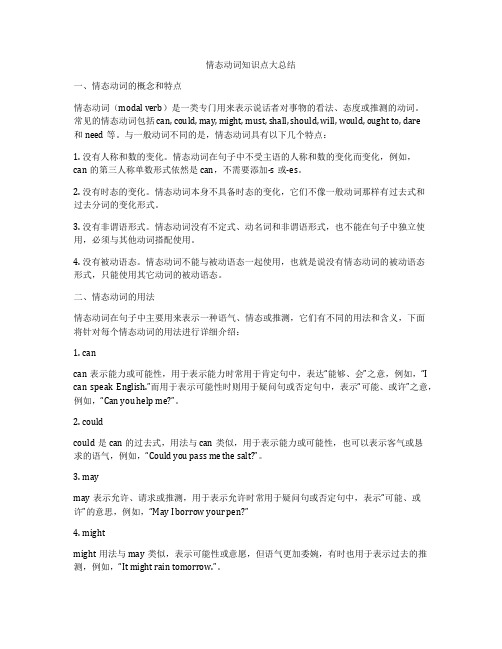
情态动词知识点大总结一、情态动词的概念和特点情态动词(modal verb)是一类专门用来表示说话者对事物的看法、态度或推测的动词。
常见的情态动词包括 can, could, may, might, must, shall, should, will, would, ought to, dare和need等。
与一般动词不同的是,情态动词具有以下几个特点:1. 没有人称和数的变化。
情态动词在句子中不受主语的人称和数的变化而变化,例如,can的第三人称单数形式依然是can,不需要添加-s或-es。
2. 没有时态的变化。
情态动词本身不具备时态的变化,它们不像一般动词那样有过去式和过去分词的变化形式。
3. 没有非谓语形式。
情态动词没有不定式、动名词和非谓语形式,也不能在句子中独立使用,必须与其他动词搭配使用。
4. 没有被动语态。
情态动词不能与被动语态一起使用,也就是说没有情态动词的被动语态形式,只能使用其它动词的被动语态。
二、情态动词的用法情态动词在句子中主要用来表示一种语气、情态或推测,它们有不同的用法和含义,下面将针对每个情态动词的用法进行详细介绍:1. cancan表示能力或可能性,用于表示能力时常用于肯定句中,表达“能够、会”之意,例如,“I can speak English.”而用于表示可能性时则用于疑问句或否定句中,表示“可能、或许”之意,例如,“Can you help me?”。
2. couldcould是can的过去式,用法与can类似,用于表示能力或可能性,也可以表示客气或恳求的语气,例如,“Could you pass me the salt?”。
3. maymay表示允许、请求或推测,用于表示允许时常用于疑问句或否定句中,表示“可能、或许”的意思,例如,“May I borrow your pen?”4. mightmight用法与may类似,表示可能性或意愿,但语气更加委婉,有时也用于表示过去的推测,例如,“It might rain tomorrow.”。
2015届二轮复习高三英语学科词性系列复习动词
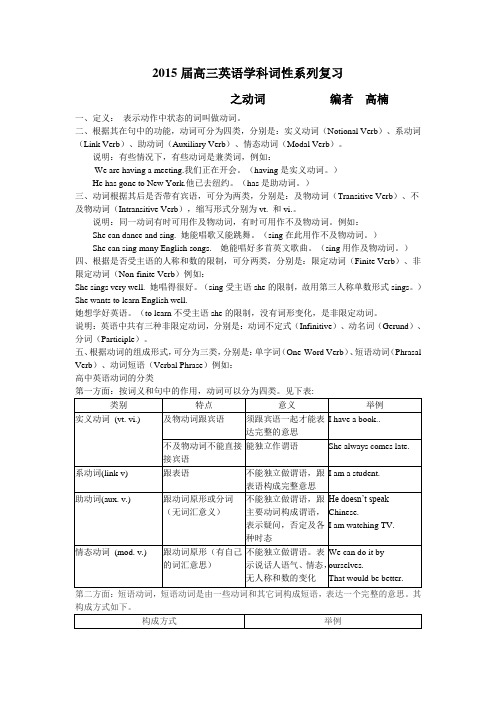
2015届高三英语学科词性系列复习之动词编者高楠一、定义:表示动作中状态的词叫做动词。
二、根据其在句中的功能,动词可分为四类,分别是:实义动词(Notional Verb)、系动词(Link Verb)、助动词(Auxiliary Verb)、情态动词(Modal Verb)。
说明:有些情况下,有些动词是兼类词,例如:We are having a meeting.我们正在开会。
(having是实义动词。
)He has gone to New York.他已去纽约。
(has是助动词。
)三、动词根据其后是否带有宾语,可分为两类,分别是:及物动词(Transitive Verb)、不及物动词(Intransitive Verb),缩写形式分别为vt. 和vi.。
说明:同一动词有时可用作及物动词,有时可用作不及物动词。
例如:She can dance and sing. 她能唱歌又能跳舞。
(sing在此用作不及物动词。
)She can sing many English songs. 她能唱好多首英文歌曲。
(sing用作及物动词。
)四、根据是否受主语的人称和数的限制,可分两类,分别是:限定动词(Finite Verb)、非限定动词(Non-finite Verb)例如:She sings very well. 她唱得很好。
(sing受主语she的限制,故用第三人称单数形式sings。
)She wants to learn English well.她想学好英语。
(to learn不受主语she的限制,没有词形变化,是非限定动词。
说明:英语中共有三种非限定动词,分别是:动词不定式(Infinitive)、动名词(Gerund)、分词(Participle)。
五、根据动词的组成形式,可分为三类,分别是:单字词(One-Word Verb)、短语动词(Phrasal Verb)、动词短语(Verbal Phrase)例如:高中英语动词的分类第一方面:按词义和句中的作用,动词可以分为四类。
情态动词的用法
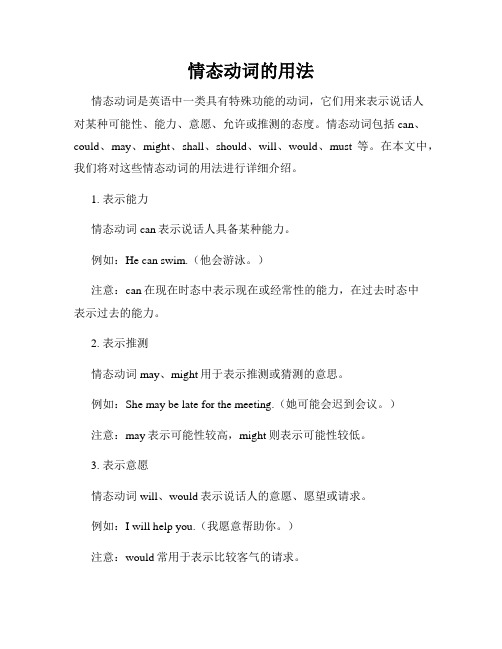
情态动词的用法情态动词是英语中一类具有特殊功能的动词,它们用来表示说话人对某种可能性、能力、意愿、允许或推测的态度。
情态动词包括can、could、may、might、shall、should、will、would、must等。
在本文中,我们将对这些情态动词的用法进行详细介绍。
1. 表示能力情态动词can表示说话人具备某种能力。
例如:He can swim.(他会游泳。
)注意:can在现在时态中表示现在或经常性的能力,在过去时态中表示过去的能力。
2. 表示推测情态动词may、might用于表示推测或猜测的意思。
例如:She may be late for the meeting.(她可能会迟到会议。
)注意:may表示可能性较高,might则表示可能性较低。
3. 表示意愿情态动词will、would表示说话人的意愿、愿望或请求。
例如:I will help you.(我愿意帮助你。
)注意:would常用于表示比较客气的请求。
4. 表示推测的过去情态动词must常用于表示对过去情况的推测或肯定。
例如:He must have missed the bus.(他肯定错过了公交车。
)注意:must用于表示对过去情况的肯定,而might用于表示对过去情况的推测。
5. 表示义务或必要性情态动词must表示对义务、必要性或确定性的肯定。
例如:You must finish your homework.(你必须完成作业。
)6. 表示建议或应该情态动词should表示建议或应该。
例如:You should go to bed early.(你应该早点睡觉。
)注意:should还可以表示对过去情况的推测,例如:He should have arrived by now.(他现在应该已经到达了。
)7. 表示允许或许可情态动词can与may可以用于表示许可或允许。
例如:Can I borrow your pen?(我可以借你的钢笔吗?)8. 表示可能性情态动词could用于表示可能性。
情态动词用法总结归纳
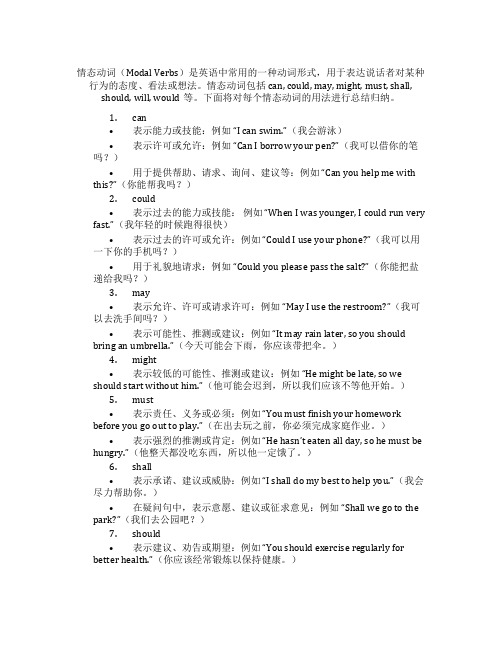
情态动词(Modal Verbs)是英语中常用的一种动词形式,用于表达说话者对某种行为的态度、看法或想法。
情态动词包括can, could, may, might, must, shall, should, will, would等。
下面将对每个情态动词的用法进行总结归纳。
1.can•表示能力或技能:例如“I can swim.”(我会游泳)•表示许可或允许:例如“Can I borrow your pen?”(我可以借你的笔吗?)•用于提供帮助、请求、询问、建议等:例如“Can you help me with this?”(你能帮我吗?)2.could•表示过去的能力或技能:例如“When I was younger, I could run very fast.”(我年轻的时候跑得很快)•表示过去的许可或允许:例如“Could I use your phone?”(我可以用一下你的手机吗?)•用于礼貌地请求:例如“Could you please pass the salt?”(你能把盐递给我吗?)3.may•表示允许、许可或请求许可:例如“May I use the restroom?”(我可以去洗手间吗?)•表示可能性、推测或建议:例如“It may rain later, so you should bring an umbrella.”(今天可能会下雨,你应该带把伞。
)4.might•表示较低的可能性、推测或建议:例如“He might be late, so we should start without him.”(他可能会迟到,所以我们应该不等他开始。
)5.must•表示责任、义务或必须:例如“You must finish your homewor k before you go out to play.”(在出去玩之前,你必须完成家庭作业。
)•表示强烈的推测或肯定:例如“He hasn’t eaten all day, so he must be hungry.”(他整天都没吃东西,所以他一定饿了。
7.情态动词和虚拟语气
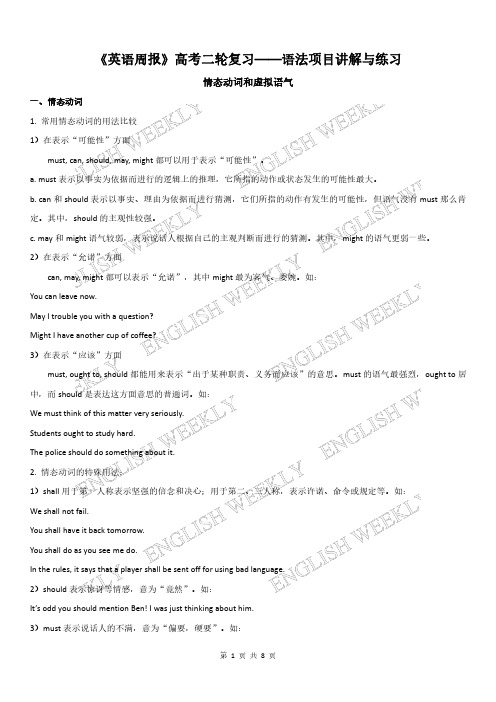
《英语周报》高考二轮复习——语法项目讲解与练习情态动词和虚拟语气一、情态动词1.常用情态动词的用法比较1)在表示“可能性”方面must,can,should,may,might都可以用于表示“可能性”。
a.must表示以事实为依据而进行的逻辑上的推理,它所指的动作或状态发生的可能性最大。
b.can和should表示以事实、理由为依据而进行猜测,它们所指的动作有发生的可能性,但语气没有must那么肯定。
其中,should的主观性较强。
c.may和might语气较弱,表示说话人根据自己的主观判断而进行的猜测。
其中,might的语气更弱一些。
2)在表示“允诺”方面can,may,might都可以表示“允诺”,其中might最为客气、委婉。
如:You can leave now.May I trouble you with a question?Might I have another cup of coffee?3)在表示“应该”方面must,ought to,should都能用来表示“出于某种职责、义务而应该”的意思。
must的语气最强烈,ought to居中,而should是表达这方面意思的普通词。
如:We must think of this matter very seriously.Students ought to study hard.The police should do something about it.2.情态动词的特殊用法:1)shall用于第一人称表示坚强的信念和决心;用于第二、三人称,表示许诺、命令或规定等。
如:We shall not fail.You shall have it back tomorrow.You shall do as you see me do.In the rules,it says that a player shall be sent off for using bad language.2)should表示惊讶等情感,意为“竟然”。
情态动词总结知识点归纳

情态动词总结知识点归纳情态动词的用法:1. 表示能力和可能性情态动词 can, could, may, might 表示能力和可能性。
例如:She can speak three languages. (她能说三种语言。
)It may rain later. (可能会下雨。
)I might go to the party if I finish my work in time. (如果我及时完成工作,我可能会去参加派对。
)2. 表示义务和必要性情态动词 must, have to 表示义务和必要性。
例如:You must finish your homework before you can go out to play. (你必须在外出玩之前完成作业。
)I have to study for my exams. (我必须为考试而学习。
)3. 表示推测和猜测情态动词 may, might, could 表示推测和猜测。
例如:He may be at home. (他可能在家。
)She might have forgotten about the meeting. (她可能忘记了会议。
)I think it could rain later. (我认为可能会下雨。
)4. 表示请求和建议情态动词 can, could, may, might, will, would, shall, should, ought to 表示请求和建议。
例如:Could you pass me the salt, please? (你能递给我盐吗?)You may want to consider studying abroad. (你可能会考虑出国留学。
)You should stop smoking. (你应该戒烟。
)5. 表示允许和禁止情态动词 can, could, may, might 表示允许,而情态动词 must, shall 表示禁止。
2015年高考英语二轮复习优化单项选择专题卷7(含解析)

2015届高考英语二轮复习优化单项选择专题卷7(含解析)1..—Jenny, I've finished my summer school classes.—Well, Chinese is _______ difficult to learn, isn't it?—It seemed that _______ at first. But after a while it starts to get easier. I got an A in the exam.A. fair; muchB. pretty; wayC. very; methodD. too; so2.She has just finished ___ her shopping.A. to makeB. to doC. doingD. making3.Though ________ in a big city Jim always prefers to paint the primitive(原始的)scenes of country life.A. raisedB. grownC. caredD. fed4.These two books are very interesting. You can choose _________ of them.A.bothB. eachC. eitherD. Any5.30. —I _________ his telephone number.—I have his number, but I _________ to bring my phone book.”A.forget, forgetB. forgot, forgotC. forgot, forgetD. forget, forgot6.The Emperor could not do anything, but ___ praise for the cloth.A. sang highlyB. thought highlyC.thought highD.sang high 7.The little girl _____ there alone.A. not dare goB. dares not goC. dare not goD. dare not to go 8.--Well done, Jack !--Thanks. But given more time, I__________ it better.A. shouldn't have doneB. could have doneC. might not doD. could do9.He used the small room ___ a lab.A. likeB.asC.toD.about10.Johnny, you ________ play with the knife, you ________ hurt yourself.A. won’t; can’tB. mustn’t; mayC. shouldn’t; mus tD. can’t; shouldn’t11.In spite of the thunderstorm, the children slept _____ all night.A. denselyB. soundlyC. loudlyD. noisily12.When the invader arrived, millions of people ____ from their homeland.A. had turned awayB. were turned awayC. had turned outD. were turned out 13.______ strong and powerful China will certainly benefit ______ whole world.A.A; a B.The; a C.The; the D.A; the14.The official said rescuers were working_____to find the missing miners in the coal mine blast.A.round the clockB.in the clockC.around the timeD.in the meantime 15.Not everyone likes everyone else, _____?A. does oneB. does everyoneC. do theyD. don’t they16.—He hasn’t finished the work yet.— Well, he _____.A. oughtB. ought toC. ought to haveD. ought to have finished17.The _______ that someday he would succeed cheered him through many disappointments.A. reliefB. beliefC. trustD. view18.—Why does Jane look unhappy today?.— A letter from her brother _________ a wave of homesickness.A. set outB. set offC. set aboutD. set up19.95. One man shouted at the boy, “Be ________, boy! What’s the matter with you?A. quiteB. quietlyC. quietD. Silently 20.—Will the match be cancelled because of the bad weather?—No. Rain or shine,the match will be held as .A. schedule B.scheduling C. scheduled D. to scheduleFranceLondon22.-----Do your brother intend to study German?---Yes ,he intends ________.A. /B. toC. soD. that23.Never give up your effort, ______ you are sure to get what you’re trying to get.A.and B.before C.or D.but 24.Look at the new computers, of ______ none are produced abroad.A. themB. whomC. whichD. these25.We’ll arrive in_______ European country in half ___________ hour.A. a; anB. an; anC. a; aD. an; a26.A truly creative person can tell the same story time after time and still ___ with fresh ideas.A.come along B.come on C.come up D.come out27.He’s perfectly to live in the mountain and paint pictures all day, though he is badly off.A. curiousB. proudC. anxiousD. content28.A horrible thought _________ him when he was waiting for Tom in the airport: what if the plane from Malaysia had been hijacked(劫持)?A. attackedB. struckC. beatD. occurred29.It is nice to hear from a close friend. ______, we last met more than thirty years ago.A. What’s moreB. That is to sayC. In other wordsD. Believe it or not30.Traditional folk arts of Tianjin like paper cutting_______at the culture show of the 2010 Shanghai World Expo.A. are exhibitingB. is exhibitingC. are being exhibitedD. is beingexhibited31.----When can we go to visit you?---- Anytime you feel like ______.A. oneB. itC. thatD. so32.33.Yesterday I _______ an old friend of mine at the shopping mall.A.came up B. came out C. came across D. came down35.These comments are not directly ___________ to this enquiry.A. concernedB. relevantC. differentD. involved36._____A.Having paid my taxesB.I paid my taxesC.Paying my taxes37.—Waiter, could I have the bill please?—Oh, no, Jerry. ________.A.This is my treat B.I'll take the orderC.Let's ask for the bill D.It's up to me38.It’s really ____ fun to walk alone with _______ full moon hanging in the sky.A.a; the B.a; 不填 C the; a D.不填; a39.—Come on, baby! You will succeed. We all wish to get good news.—________ but I'll do my best.A.No problem B.It is impossibleC.I can't promise D.Don't worry40.E-mail, as well as the telephone, _____an important part in daily communication.A.is playing B.have played C.are playing D.play 41.I have had such a case_________a boy whispered to his classmate now and then while I was having lessons.A. asB. thatC. whichD. where42.I bought a dress for only 10 dollars in a sale; it was a real ______. A. exchange B. business C bargain D. reward 43.(2014·陕西咸阳模拟考试二)The official________I thought would be seriously punished received a raise instead.A.whomever B.whoeverC.who D.whom44. Patience is a kind of quality—and that is ____ what it takes to do anything well.A. whatB. whichC. thatD. How45.At the end of the meeting, it was announced that an agreement ________.A. has been reachedB. had been reachedC. has reachedD. had reached46. --Can you tell me ?--By doing more reading.A. how I will improve my writingB. which way I can chooseC. how do I deal with my writingD. what’s wrong with my writing47.I wrote him a letter to show my _____ of his thoughtfulness.A. achievementB. agreementC. attentionD. appreciation48.Who would you rather ______ with the teacher about the problem?A. talkingB. have talkC. have talkedD. talk49.He _____ of _____ he had said at the meeting.A. was accused; thatB. was accused; whatC. was charged; whatD. accused; what50.There is no doubt that our educational system leaves something __________.A. being desiredB. to be desiredC. to desireD. to have been desired参考答案【答案】B【解析】这里的pretty是副词,表“相当、非常”的意思,同very;much表困难的程度;so表看法,不符合题意。
英语情态动词(完整版)含解析

英语情态动词(完整版)含解析一、选择题1.— Could you please clean your room?—_________. I’ll do it at once.A.Yes, sure B.Sorry, I can’t C.It doesn’t matter D.Here you are 2.—Jim seems to be in low spirits. ________?—No one liked his plan. All his efforts were useless.A.Guess what B.What about him C.So what D.What happened 3.—Here’s your change.—________A.My pleasure. B.Thank you. C.With pleasure. D.No problem. 4.—I plan to find a part-time job in the coming summer holiday.—________ It will be a totally different experience.A.See you later. B.You’d better not.C.I’m sorry to know that.D.That sounds like fun.5.—Oh, no! There isn't any salt left.—____________! I’ll buy some when I go into town.A.Good idea B.Go ahead C.Never mind D.Not at all6.—I thought I’d try to repair the car myself.— __________ ! You know nothing about the car.A.No way B.You can’t be serious C.I couldn’t agree more D.Don’t change a thing7.— I am so sorry to keep you waiting for such a long time.— ________.A.Please shut up B.It’s your m istake C.It doesn’t matter D.Don’t explain it 8.—It's a shame to ask you to lend me more money, but. . .— ______ . You really need money to keep on with your education.A.Don't be silly B.Forget it C.No way D.Don't mention it 9.—Amazingly, I've managed to finish the project by myself.—___________I told you it was easyA.With pleasure. B.Guess what? C.There you are! D.It doesn’t matter 10.--Would you like to go shopping with me on Saturday?-- . I have to help my mother with housework.A.I’m afra id not B.Take your timeC.Enjoy yourself D.That’s all right11.–This box is too heavy for me to carry upstairs.–__________A.You may ask for help B.I’ll give you a handC.Please do me a favor D.I’d come to help12.—I just got a message from Ms. Yang and she said she would come to our meeting this afternoon.— She always has good ideas.A.Why not? B.What a pity! C.Time is up. D.That’ll be very nice. 13.-Do you think the rain will stop tomorrow?-_____. It has rained for four days. It’s too wet everywhere.A.I hope not B.I don’t think soC.Don’t worry D.I hope so14.—I’m so sorry to keep you waiting for me so long.— ________!A.With pleasure. B.Don’t say so C.I don’t think so D.It doesn’t matter 15.—Would you please help me with my spoken English?—__________. First you should know practice makes perfect.A.That’s right B.No problem C.Quite well D.No, thanks 16.—Lucy, can you help me with my history?—________. I am good at it.A.With pleasure B.I’m afraid not C.Sorry, I can’t D.No way 17.—Sir, this is your order, two chicken hamburgers and a cup of coffee. ________—I’ll have them here.A.For here or to go? B.Something to drink? C.Anything else? D.Is that OK? 18.—I missed the basketball game last Saturday because I had an exam.—________, but it will be repeated on TV.A.Take it easy B.You are lucky C.That’s wonderful D.Never mind 19.—Why not take your son to watch the new film A Little Red Flower?—__________.A.Good idea B.No problem C.Good luck D.No way 20.—Do you like cartoons or scary movies?—_______. They can cheer me up.A.Yes, I do B.No, I don't C.Cartoons D.Scary movies 21.—I’m sorry I didn’t make it to your birthday party last night.— ________ I know you are busy recently.A.Why not? B.Don’t mention it.C.No way. D.That’s all ri ght. 22.—Excuse me, can you give me some water? The cup is empty.—________A.Go ahead. B.My pleasure C.At your service D.You’d better not. 23.—You seem so happy today, Jack.—________? I won the first prize in the singing competition yesterday.A.So what B.How come C.Guess what D.Why not 24.—I’m going hiking this afternoon. Would you like to go with me?—______, but I must finish my homework first.A.Sorry, I don’t B.That’s right C.I’d love to D.Not at all25.—I prefer western food. It’s delicious and goo d for us.—_______ ? But western food is said to be high in sugar and fat.A.Is that right B.How do you know thatC.Do you really think so D.Who told you that26.—Many people think women are better at cooking than men.—________. Most top chefs in the world are men.A.I agree B.I can’t agree more C.Not at all D.That’s not the case 27.—All of Mark Twain’s novels are popular.— ________. Especially The Adventures of Tom Sawyer.A.I can’t agree more B.That’s not the case C.That’s not the point D.Don’t mention it 28.—Could you help me look after my baby ________ I am away?—________.A.as; With pleasure B.while; My pleasure C.as; That’s all right D.while; With pleasure29.—Would you mind if I open the window?—_______.We need fresh air.A.Not at all B.Yes, of course C.You’d better not D.That’s all right 30.—Only those who have a lot in common can get along well.—________ Opposites sometimes attract.A.I think so. B.I don’t think so.C.I don’t care.D.I hope so. 31.—Only those who have a lot in common can get along well.—________. Opposites sometimes attract.A.I think so B.I don’t think so C.I don’t care D.I hope so 32.— Why will you take part in the charity walk? You are not good at running at all.— ________. I run to show that I can help others.A.Not exactly B.That’s not the point C.I can’t agree more D.It sounds like a pity 33.—Shall we go to the amusement park right away or the day after tomorrow?—________. Any time will do.A.Excuse me B.Have a good timeC.It’s up to you D.I’m afraid I can’t34.—How do you like coffee, Minnie?—It tastes very terrible. ________.A.I have no idea B.I don’t mind it C.I really can’t stand it D.I can’t afford it 35.— May I have a look at the newspaper China Daily?— Certainly. ________A.Thank you. B.It’s a pity.C.Here you are. D.I’d like to. 36.—________!—Yes. It sounds gentle and relaxing.A.How good the vegetable soup is B.How exciting the storybook isC.What nice music Ann is playing D.What a beautiful flower Jim keeps 37.—The game is too hard for me. I will certainly lose.—________. You should never say no before you try.A.Forget it! B.Come on! C.I’m sorry.D.Pardon me? 38.—I wonder if Tenny is doing well in her new school.—________. She is old enough to look after herself well.A.You’re welcome B.Good luck C.It’s a pity D.No need to worry 39.—Why don’t you join in a club to practise speaking English?—________.A.That’s a good idea B.Never mind C.Yes, please D.Thank you 40.—I’ll be away on a business trip. Would you mind looking after my cat?—Not at all. ________.A.It’s my pleasure B.I’d rather not.C.I’d like it.D.With pleasure. 41.— Wow, what a good smell! Can I have a piece of cake?— ________A.No way. B.Good idea! C.HeIp yourself. D.What a pity! 42.—Summer camping gives children the chance to live away from home.—________. It is always good to help children grow up.A.That’s true.B.Come this way. C.Let me have a look. D.I don’t think we agree.43.— Would you mind my turning on the TV? The New Year concert has just begun.— ________. Just go ahead.A.Ple ase don’t B.Better not C.Of course not D.I’m afraid not 44.—I visited the Purple Mountain Observatory by myself last Saturday.—________ Why didn’t you tell me earlier?A.You did? B.I hope not. C.Have a good time. D.I can’t believe it. 45.—Mum, Joe has broken a cup!—________. Accidents always happen.A.Pretty good B.Of course C.It doesn’t matter D.That depends 46.— The movie Lost in Russia sends a message about the importance of family.— ________. It reminds me of my parents.A.I hope so B.That’s all righ t C.You bet D.I don’t think so 47.— Are you feeling any better now after taking the medicine?—________. I’m feeling even worse.A.You got it B.Never mind C.Sorry to hear that D.Quite the opposite 48.—Another Friday! Let’s go to see the play tonight.—________ I will book the tickets online.A.My pleasure. B.That’s right.C.Why not? D.Never mind. 49.—Can I look at the menu for a few more minutes before I decide?—Of course. ________, Sir.A.Make yourself at home B.Enjoy yourself C.It doesn’t matterD.Take your time50.—How about putting some pictures into the report?—________ A picture is worth a thousand words.A.I don’t think so.B.Why not?C.Thank you. D.Don’t mention it.【参考答案】***试卷处理标记,请不要删除一、选择题1.A【解析】本题考查的是情景反应,要用客气婉转的回答方式。
情态动词总结
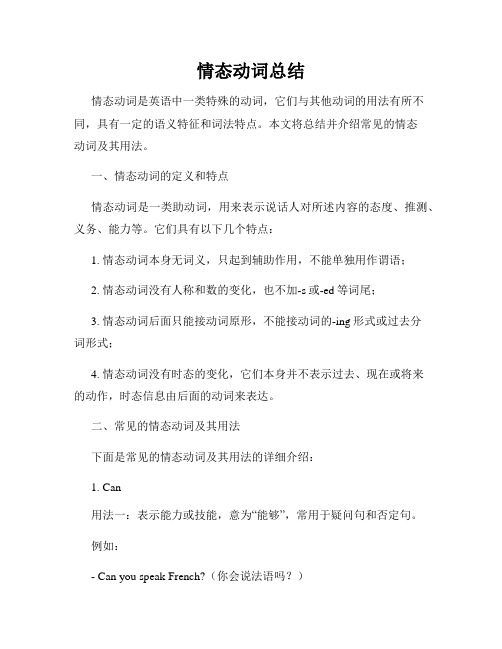
情态动词总结情态动词是英语中一类特殊的动词,它们与其他动词的用法有所不同,具有一定的语义特征和词法特点。
本文将总结并介绍常见的情态动词及其用法。
一、情态动词的定义和特点情态动词是一类助动词,用来表示说话人对所述内容的态度、推测、义务、能力等。
它们具有以下几个特点:1. 情态动词本身无词义,只起到辅助作用,不能单独用作谓语;2. 情态动词没有人称和数的变化,也不加-s或-ed等词尾;3. 情态动词后面只能接动词原形,不能接动词的-ing形式或过去分词形式;4. 情态动词没有时态的变化,它们本身并不表示过去、现在或将来的动作,时态信息由后面的动词来表达。
二、常见的情态动词及其用法下面是常见的情态动词及其用法的详细介绍:1. Can用法一:表示能力或技能,意为“能够”,常用于疑问句和否定句。
例如:- Can you speak French?(你会说法语吗?)- I can't swim.(我不会游泳。
)用法二:表示请求、允许或禁止。
例如:- Can you help me with my homework?(你能帮我做作业吗?)- You can't smoke here.(你不能在这里吸烟。
)2. Could用法一:表示过去的能力或技能,过去式形式为“could”。
例如:- When I was younger, I could run faster.(在我年轻的时候,我跑得更快。
)用法二:表示请求、邀请或建议,比“can”更客气。
例如:- Could you please pass me the salt?(请你递给我盐好吗?)3. May用法一:表示许可或允许,较正式的用法。
例如:- May I borrow your pen?(我可以借用你的钢笔吗?)用法二:表示可能性或推测。
例如:- It may rain tomorrow.(明天可能会下雨。
)4. Might用法一:表示更加不确定或推测,比“may”语气更弱。
高考英语二轮总复习 第一部分 语篇型语法填空和短文改错 专题七 情态动词和虚拟语气

译文 一家慈善机构正在为一所小学募捐,小学里的孩子们的生活条件不好。 就在几天前,一场关于关心孩子的演讲在中心公园里举行。来自该慈善机 构的演讲者呼吁政府官员在改变孩子的生活环境方面做出挑战。同时,他 们还建议市民们创造更多机会来培养孩子的良好性格。每个人都应该为 给孩子提供一个美好的童年做出贡献。孩子们同我们的未来息息相关,他 们肯定会为我们对他们的关心而做出善举的。
情态动词 意义及用法
例句
must have to
(1)必须,应该(表示主观要求); (2)肯定,想必(肯定句中表示主观推 测); ★(3)非要,偏偏(用于疑问句或条件 状语从句中) 注意:(1)mustn’t表示禁止,意为“不 准;不许”; (2)当must用于疑问句中时,其否定回 答是:No,...needn’t/don’t have to.
3.(2019·天津卷改编)The professor warned the students that on no account ___s_h_o_u_ld______they use mobile phones in his class. 解析:句意:教授警告学生们在任何情况下都不能在他的课上使用手机。on no account“在任何情况下都不……”。否定短语置于句首引起部分倒 装;warn后面的宾语从句中要使用虚拟语气:should+动词原形。
2.(2020·天津卷改编)Jim says we ____c_a_n_______stay in his house as long as we leave it clean and tidy. 解析:句意:考查情态动词。句意:吉姆说只要能够让房子保持干净、整洁, 我们就可以住在他的房子里。can表示许可,意为“可以”。
- 1、下载文档前请自行甄别文档内容的完整性,平台不提供额外的编辑、内容补充、找答案等附加服务。
- 2、"仅部分预览"的文档,不可在线预览部分如存在完整性等问题,可反馈申请退款(可完整预览的文档不适用该条件!)。
- 3、如文档侵犯您的权益,请联系客服反馈,我们会尽快为您处理(人工客服工作时间:9:00-18:30)。
合肥六中2015年高考英语二轮复习专题(七)情态动词一.《考试说明》的内容及要求高考英语分类解析分类整理及解析:山情态动词在近五年高考中主要考查四点:情态动词的基本用法;情态动词表示推测和判断的语义差别;情态动词后接不定式完成式的不同意义以及情态动词在虚拟语气的应用。
全国六年考点分布:二.近五年安徽高考考点分布及命题趋势:纵观安徽五年高考,情态动词是重点考查项目。
高考的热点依然是(1)情态动词表示推测和可能性;(2)情态动词+have done结构;(3)shall,should,can,must表示特定语气。
今后高考趋势将更加注重在具体语言环境中,根据说话人的语气来使用情态动词的能力;同时会涉及部分情态动词的特殊含义。
三.一轮复习中存在的问题有些考生在一轮复习中存在的问题:1未能区分具有相同功能的、意思相近的情态动词,特别是对于某些情态动词的特殊用法以及情态动词+have done的结构不熟悉;2未能根据句子提供的情境选择恰当的情态动词;四.教学重点和教学策略考生要掌握情态动词的意义和用法,除了要能够准确掌握他们的基本用法外,还要充分利用高考试题所设置的语境来分析句子之间所体现的特殊关系,同时能够区别具有相同功能的、意义相近的情态动词的用法,并结合虚拟语气的语境去领悟他们的用法特征。
五.专题教学主要内容(一)情态动词的基本用法1.can/could(1)表示能力。
He can complete the work on time.(2) 表示理论上的可能性,“有时候可能会。
”Even an experienced teacher can make mistakes.(3) 表示惊讶,常用在否定句和疑问句中。
How could you do such a silly thing?(4) 表示请求和允许。
表示请求时,口语中常用could代替can。
—Could I borrow your bike for a moment?—Yes, you______./Sure. Go ahead./Please help yourself.2. may/might(1)表示允许、许可。
might比may 语气更委婉。
You may use my car.(2)表示请求。
might比may 语气更委婉。
—Might I have a look at your new computer?—Yes, you may./No , you mustn’t(3) may + 主语+ 动词原形“祝某人/物…”不用might.May you succeed in the coming exam!3.must(1)表示必须,应该。
We must get to school on time.—Must I hand in my homework?—Yes, you ______. No, you_________.(2)表示禁止(用于否定句)。
Smoking must not be allowed in the office.(3)表示偏要,非得。
Why must you be talking so loudly while others are studying?If you must go there, I agree.4.shall(1) 在第一、三人称的疑问句中,用于征求对方的意见或指示。
—Has Mr. Wang arrived?—Yes,already. Shall he wait outside or just come in?(2) 在第二、三人的陈述句中,表示命令、警告、允诺或威胁。
He shall get a sum of money if he is to complete the task ahead of time.(3) 用于条约,规定,规章等文件中,表示一种义务,多用于第三人称中。
The school rules state that no child shall be allowed out of the school unless accompanied by an adult.5 should(1) 表示劝告和建议,作“应该”讲。
You should learn from each other.(2)表示预测可能性,并意为“按道理,常识,情理,经验的应该”。
It’s nearly 7 o’clock. Jack should be here at the moment.The players from Guangzhou Evergrand Football Club have been doing very well recently, so they _____ win the final match.A. needB. mightC. wouldD. should(3)表示惊讶:“竟然,居然”。
I am surprised that you should speak in such a way.(4)在if条件句中,表示可能性很小“万一”。
If anyone should come, say I’m not at home.6.will/would(1) 表示自愿做或主动提出做什么,如意志、愿望或决心等。
would 用于过去的情况。
I have told him again and again to stop smoking,but he won’t listen.I pushed the door, but it wouldn’t open.(2) 表示一种习惯性的动作,有“总是”或“总要”之意。
would 表示过去的习惯性动作。
Every morning he will have a walk along this river.When he was young, he would listen to music alone in his room.(3)表示请求和建议。
would 更加委婉客气些。
Would you like some coffee?(4) 表示事物和某种倾向或性质。
Anybody will die.Wood will float on the water.7. need /dareneed 表需要和必须常用于否定句和疑问句; dare表敢,常用于否定句,疑问句和条件句中。
I dare say是习惯用法,意思为:“我想,大概”。
dare与need 用做实意动词时有时态,人称和数的变化,但dare用于否定句和疑问句时常接不带to的不定式,need后要接带to的不定式。
—Need we make the test?—Yes, we______./No, we _______.How dare you talk like that?Does everyone dare (to) go there alone?8.ought to表示义务,意思为“应当”,相当于should。
Everyone ought to obey the traffic regulations.(二)易混淆情态动词比较1 can(could)/be able tocan, be able to都可表示“能力” can的主语是人或物,be able to的主语是人。
She can/be able to sing the song in English.This machine can make you feel comfortable.can只用于现在时和过去时(could)。
be able to可以用于各种时态。
We’ll be able to finish the work soon.I haven’t been able to see the film.could用于表示泛指过去的能力;而表示特定的某一过去能力或表示成功地做了某事时,只能用was/were able to,不能用could。
I could read when I was four.He was able to flee Europe before the war broke out.= He managed to flee Europe before the war broke out.= He succeeded in fleeing Europe before the war broke out.2 must/have tomust 侧重表示说话人的主观看法;have to 表示客观需要。
We must rely on ourselves.I have to give it up because of my illness.3 would/used towould 作为will的过去式,表示过去习惯性或重复性的动作,没有与现在对比的含义;used to表示过去经常发生的动作或存在的状态,强调今昔对比。
Last year, our English teacher would sometimes tell stories after class.When she was young, she used to be very fat.I used to have a car.特别提醒1 can’t/can never…..enough/too 表示“再…..也不为过”。
We can’t be careful enough while driving.2 may的一些固定搭配may well+动词原形,表示“完全能,很可能”。
Her appearance has changed so much that you may well not recognize her.may/might as well+动词原形,表示“最好,倒不如”。
You may/might as well do it at once.(三)情态动词表推测1. must 表示推测时只能用于肯定句中,意为“一定,必定”,表示十分肯定(在疑问句中或否定句中要用can)。
—Hi, Tom. Any idea where Jane is?—She must be in the classroom. I saw her there just now.2.can/could 用于肯定句中有时可以用来表示推测,意为“有时会”;用于疑问句中可以表示推测,意为“可能”,有时表示一种惊讶的语气;用于否定句中也可以表示推测,can’t 意为“不可能”,语气很强烈。
Mr Bush is on time for everything. How can it be that he was late for the meeting?It is usually warm in my hometown in March,but it can be rather cold sometimes.3.may/might用于肯定句中可以用来表示推测,意为“可能”;用于否定句中也可以表示推测,may not 意为“可能不”,表示一种不太确定的语气。
